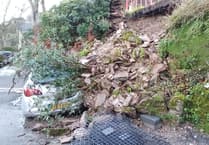The incident was reported to the RSPCA after passers-by spotted the injured swan last Tuesday (June 13).
The rescue was difficult, as the lead weight and fishing line caused the swan to panic.
RSPCA chief inspector Richard Abbott said: “Rescuing a large, injured and frightened bird from a body of water is never straightforward, so quite a lot of planning was required.”
After searching in a boat, his colleagues Jim Farr and Steve Donohue eventually located the swan when he was spotted by wild swimmers.
Richard continued: “We knew that if the poor bird was to survive, we would have to catch him first - and that was not going to be simple. Injured wildlife - including swans - are naturally even more reluctant than usual to come near humans, even if tempted with food. And this time was no different.”
After slowly coaxing the swan with food, Richard was able to deploy his swan catcher.
He said: “He was understandably frightened and resistant to being brought up onto the bank, but once he was secured with the assistance of RSPCA animal rescue volunteer Sharon Hill, he quietened down a bit.
“It was relatively straightforward to remove the fishing hook and line, which members of the public had spotted stuck in his beak.
“But to our horror, when we checked him over, we found more fishing line and a second fishing hook - this one with a nasty barb - embedded in his neck. The barb needed to be cut off before we successfully removed this second hook, but thankfully we were able to do this without causing the swan much additional distress.”
The rescue has prompted the RSPCA to warn members of the public of the dangers that leftover fishing lines can cause.
They said: “The RSPCA strongly urges those who enjoy fishing to be extra cautious to make sure nothing is left behind. Most anglers are very responsible when disposing of their litter, but it only takes one piece of snagged line to be left in a tree or dropped near the water to endanger the life of an animal. RSPCA wildlife experts ask all those who enjoy fishing to follow the Angling Trust’s Take 5 campaign and make use of the recycling scheme to dispose of their waste tackle and line.”




